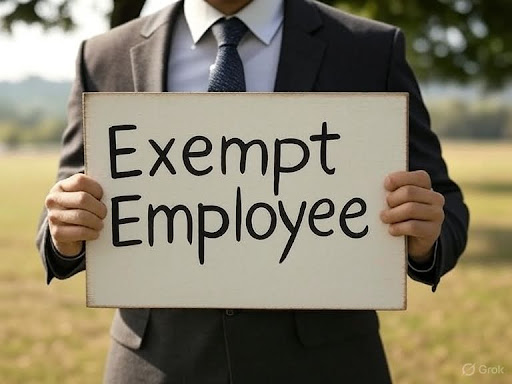When I first heard the term “exempt employee,” I had a lot of questions. It seemed straightforward, but the more I learned about labor laws, the more I realized it was a bit more complex. If you’re like me and have wondered what makes an employee exempt in California, you’re not alone. In this blog, I’ll break down everything you need to know about exempt employees in California, from salary requirements to job duties and the key legal distinctions. Whether you’re an employee or an employer, this information will help you understand the important nuances of exempt status in the Golden State.
What Makes an Employee Exempt in California?
In California, being classified as an “exempt employee” means you are generally not entitled to overtime pay, even if you work more than 40 hours a week. This exemption status is based on two key factors: salary level and job duties. It’s important to understand that just because someone has a fancy job title or works long hours doesn’t necessarily mean they’re exempt.
To qualify as an exempt employee in California, you need to meet both of the following requirements:
- Salary Basis: Exempt employees must be paid a fixed salary rather than an hourly wage.
- Duties Test: The employee’s primary duties must involve certain kinds of work, such as executive, administrative, or professional tasks.
California’s labor laws are stricter than federal laws, so it’s essential to stay informed about both state and national guidelines to ensure proper classification.
California’s Minimum Salary Requirements for Exempt Employees

A common misconception about exempt employees is that they can be exempt regardless of how much they make. In California, there’s a minimum salary requirement for someone to be classified as exempt. As of 2025, to be an exempt employee, you must earn at least twice the state minimum wage for full-time employment. This means that the salary threshold is about $64,480 annually, or approximately $5,373 per month.
It’s important to note that if you don’t meet the salary threshold, you cannot be classified as exempt, even if your job duties align with exempt criteria. This is a critical point for both employees and employers to understand when reviewing employment status.
Key Exempt Employee Categories in California
California recognizes four main categories of exempt employees. Let’s break them down:
Executive Exemption
An executive exempt employee typically manages other employees and has decision-making authority. For instance, a manager who supervises a team and has the ability to hire or fire employees would be classified as exempt.
Administrative Exemption
This exemption applies to employees whose job duties involve office or non-manual work directly related to management policies. For example, an HR professional whose primary duty is to administer company policies may fall under this exemption.
Professional Exemption
Employees who perform work requiring advanced knowledge in a specialized field such as law, medicine, engineering, or accounting generally qualify as exempt.
Computer Professional Exemption
This exemption applies to employees who engage in high-level computer-related duties, such as software developers and IT professionals working in specialized areas like system analysis and programming.
Each exemption category has its own set of specific criteria. It’s crucial for both employers and employees to ensure that the job duties align with the required exemptions.
Common Misconceptions About Exempt Employees

Over the years, I’ve heard many misconceptions about exempt employees. Some people think that exempt employees never receive overtime, while others believe that job titles automatically make someone exempt. But here’s the truth: the job title doesn’t matter as much as the actual duties performed and the salary earned.
For example, someone with the title “manager” might still be non-exempt if their job duties are mostly administrative and not related to managing other employees. Similarly, just because an employee is salaried doesn’t automatically make them exempt—they still need to meet both the salary and duties tests.
Exempt vs. Non-Exempt: Key Legal Differences
The main difference between exempt and non-exempt employees lies in how they are compensated for overtime work. Non-exempt employees are entitled to overtime pay for any time worked beyond 40 hours per week at a rate of 1.5 times their regular hourly rate.
Exempt employees, however, are not entitled to overtime pay, even if they work over 40 hours in a week. This means that, in exchange for their job duties and responsibilities, exempt employees enjoy certain benefits, such as greater flexibility in how they manage their work hours.
The legal implications of misclassifying employees can be severe, with penalties for failing to pay overtime, back wages, and fines.
How to Properly Classify Employees as Exempt or Non-Exempt
Employers must carefully evaluate each employee’s job duties to determine whether they are exempt or non-exempt. Here’s a simple process to follow:
- Review the Salary: Check if the employee meets the salary threshold set by California law.
- Evaluate Job Duties: Ensure that the employee’s primary job duties match one of the exempt categories (executive, administrative, professional, etc.).
- Consult Legal Resources: If you’re unsure, seek advice from a labor attorney or use online tools such as California’s Exempt/Nonexempt Wizard.
It’s vital for employers to conduct this evaluation regularly to avoid misclassification and potential legal complications.

What to Do if You’re Misclassified as Exempt or Non-Exempt
If you suspect you’ve been misclassified as exempt or non-exempt, it’s important to take action. For employees, the first step is usually to bring the issue to your employer’s attention. If the problem isn’t resolved internally, you can file a claim with the California Labor Commissioner’s Office.
For employers, it’s essential to stay on top of labor law changes and review employee classifications regularly. If a mistake is found, it’s best to correct it promptly to avoid legal consequences.
What Happens If an Employee is Misclassified as Exempt?
Misclassification can lead to serious consequences, including lawsuits and penalties. If an employee is misclassified as exempt, they may be entitled to back pay for overtime wages, as well as penalties for any unpaid overtime hours. Employers may also face fines and increased scrutiny from the Department of Labor.
To avoid such issues, it’s critical to ensure that your employees are correctly classified according to both state and federal labor laws.
Special Considerations for Exempt Employees in California
California labor law has specific rules that apply to exempt employees. For instance, while exempt employees are not entitled to overtime, they must still be provided with rest and meal breaks. Exempt employees working in California must receive a 30-minute meal break if they work more than five hours a day, and a second 30-minute meal break if they work more than 10 hours a day.
Employers should familiarize themselves with these specific requirements to ensure they remain compliant.
Frequently Asked Questions About Employee in California
What is the salary threshold for an exempt employee in California?
To be classified as exempt, an employee must earn at least twice the state minimum wage for full-time work, which is about $64,480 annually as of 2025.
Can an employee be exempt if their job title is “Manager”?
Job titles do not determine exempt status. The employee’s actual duties must align with exempt categories such as executive or administrative work.
What are the four main exemptions for exempt employees in California?
The four main exemptions are Executive, Administrative, Professional, and Computer Professional exemptions.
How do I know if I am correctly classified as exempt in California?
Employees should review their job duties and salary to ensure they meet the requirements for an exempt classification. If unsure, seek legal advice.
What should an employer do if they incorrectly classify an employee as exempt?
Employers should correct the classification promptly and pay any back overtime wages owed to the employee.
Conclusion: What is an Exempt Employee in California?
In California, an exempt employee is someone who is not entitled to overtime pay based on their salary and job duties. It’s important for both employees and employers to understand the criteria for exemption, including salary thresholds and specific job duties. Misclassification can lead to serious legal consequences, so it’s essential to stay informed and review your status regularly.
By following California’s strict labor laws, employers can avoid costly mistakes, and employees can ensure they are being compensated fairly for their work. Understanding what makes an employee exempt in California is crucial, not only for legal compliance but also for maintaining a fair and transparent workplace.







